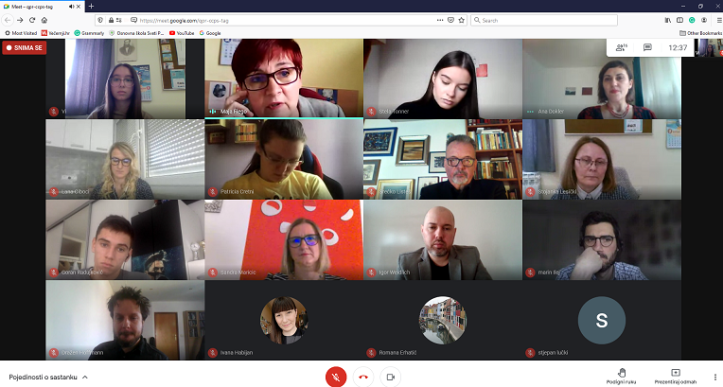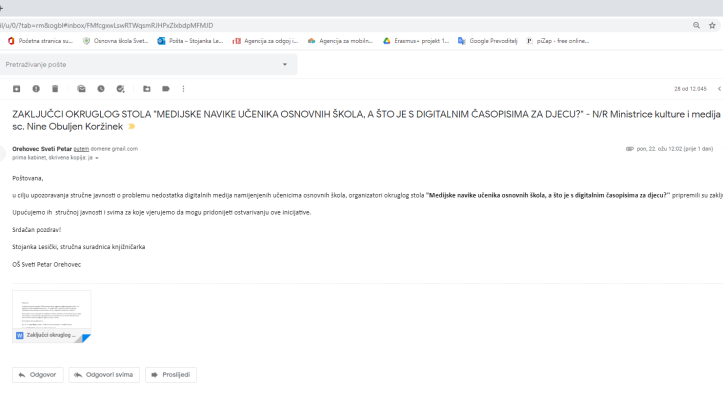In order to disseminate the conclusions of round table “Media habits of primary school students, and what about digital magazines for children?” they were sent to the Ministry of Education, the Ministry of Culture and Media, UNICEF and several other institutions and associations.
Below there are the conclusions of the round table in Croatian end English language.

Dear,
at the initiative of the Erasmus + project “Young journalists of today, responsible digital citizens of tomorrow” and with the support of the portal MEDIJSKAPISMENOST.HR, on 24 February 2021, was held an online round table “Media habits of primary school students, and what about digital magazines for children?”
The topics of the round table were the media habits of primary school students, how and where they are informed, and whether there is a need to develop a platform at the national level that would function as a digital newsletter for children and youth.
The panelists were:
Sc.D. Lana Ciboci -DKMK – Society for Communication and Media Culture
Sc.D. Srećko Listeš – Agency for Education
Igor Weidlich – Editor-in-Chief of the student magazine Global, an external associate of the Faculty of Political Science
Maja Flego – Advisor to the Ombudsman for Children
Dražen Hoffmann – coordinator of educational programs of the GONG association
Marin Ilej – Head of the Communications Department of the UNICEF Office for Croatia
Sandra Maričić – editor of the show on media literacy”Five for five” of the First Program of the Croatian Radio
Patricia Čretni, member of the Network of Young Advisers to the Ombudsperson for Children
Stela Tonner, a member of the Network of Young Advisers to the Ombudsperson for Children
Niko Radujković, member of the Network of Young Advisors to the Ombudsperson for Children
Petra Kušec, member of the journalism group of the SvetiPetar Orehovec Primary School
Stojanka Lesički, coordinator of the project ” Young journalists of today, responsible digital citizens of tomorrow” Elementary school Sveti Petar Orehovec
Panelists agreed with the idea that launching a digital magazine/platform would be a valuable initiative in which it would be important to involve the children themselves. In order to warn the professional public about the problem of lack of digital media intended for primary school students, the organizers of the round table prepared conclusions to address them to all who can contribute to the realization of this initiative.
CONCLUSIONS of the round table “Media habits of primary school students, and what about digital magazines for children?”

According to the UN Convention on the Rights of the Child, the key components for the realization of children’s rights to participation are the availability of information to children, the right to freedom of expression, and freedom of opinion.
To achieve these goals, it would be extremely important that to establish a digital medium at the national level with multimedia content created in age-appropriate forms for children. Such a medium would be more visible to children than the print media and in line with modern trends in information and communication technology. It should be a kind of focal point to help children find valuable and useful information, including media literacy and democratic citizenship, as well as important information to help children and young people better understand themselves, and the problems they face growing up.
Roundtable participants believe that such a medium should provide children with content devoid of covert advertising and fake news, which are often present on social networks – and social networks are the most important source of information for youngs in recent years.
All participants of the round table also agreed that through such a medium, representative contents of children’s school newspapers, created by primary school students within school journalistic groups, should become available. In this way, the voice of children would be heard and children authors would be additionally motivated to create media content.
Given that such a project would offer important media content for children and their well-being and support the realization of a number of participatory and other rights of children, we believe that it should have secured sources of funding, ie state support if its commercialization is to be avoided.